|
|
|
Sort Order |
|
|
|
Items / Page
|
|
|
|
|
|
|
| Srl | Item |
| 1 |
ID:
146411


|
|
|
|
|
| Summary/Abstract |
This article argues that behind the background of the December 2015 agreement between Japan and South Korea over the issue of comfort women lies the emerging common understanding about the nature of the issue of comfort women, particularly the issue of coerciveness, and the subsequent moderation in rhetoric in mutual security cooperation in view of the destabilization in the region, particularly due to the rise of China and the nuclear and missile threats from North Korea.
|
|
|
|
|
|
|
|
|
|
|
|
|
|
|
|
| 2 |
ID:
146410


|
|
|
|
|
| Summary/Abstract |
This article introduces the background of the presidential and congressional election and discusses the reason for the results. The Democratic Progressive Party (DPP) won both the presidential and congress members' elections, which signals emergence of the first real regime change in Taiwan. However, the style of the Tsai government isn't the same as that of the Chen Shui-bian government and will probably adopt a more modest policy on the cross-strait issue. On the other hand, the Nationalist Party (KMT) lost the election so severely that it's so difficult to recover the situation. On this point, it’s possible that the policy framework of Taiwan, like a two party system, will change drastically in the near future. Foreign policy, especially policy regarding Japan, will be changed by the new government. Actually, the People's Republic of China (PRC) government basically didn't interfere with Ma's foreign policy, so Ma could achieve many foreign policy initiatives. He concluded an economic partnership agreement (EPA) with Singapore and New Zealand, and agreements for investment and fishing with Japan. However, the PRC probably won't provide enough room for foreign policy for the Tsai government.
|
|
|
|
|
|
|
|
|
|
|
|
|
|
|
|
| 3 |
ID:
146408


|
|
|
|
|
| Summary/Abstract |
Japan has made its presence felt in the realm of power politics by focusing on the promotion of “human security” and sustainable development. At the core of both concepts lies the issue of health. As Japan prepares for the upcoming G7 Summit, Keizo Takemi examines the question of what sort of leadership role Japan should play in the critical field of health.
|
|
|
|
|
|
|
|
|
|
|
|
|
|
|
|
| 4 |
ID:
146413
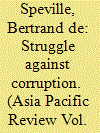

|
|
|
|
|
| Summary/Abstract |
In 2010 the author, in an article for this journal, questioned the methods put forward by the international donor community to overcome corruption in the transitional and developing countries of the world. Five years on, the progress against this scourge has been minimal. In this article the author explores some of the reasons why. Apart from the obvious reason, namely the failure of political will in the countries themselves, he outlines some of the policy and practical errors that continue to hinder the progress that could be made.
|
|
|
|
|
|
|
|
|
|
|
|
|
|
|
|
| 5 |
ID:
146409
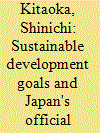

|
|
|
|
|
| Summary/Abstract |
Substantial progress toward achieving the Millennium Development Goals (MDGs) was made, but unsolved issues remain. The Sustainable Development Goals (SDGs) succeeded the MDGs in 2015. In Japan the concept of “Human Security” has been incorporated into its foreign policy since the 1990s and is explicitly stated as the basic concept of Japan's Development Cooperation Charter issued in 2015. Also included in the Charter is Japan's “Proactive Contribution to Peace” policy and national interest, both of which are closely related to the concept of Human Security.
|
|
|
|
|
|
|
|
|
|
|
|
|
|
|
|
| 6 |
ID:
146412
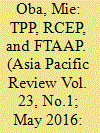

|
|
|
|
|
| Summary/Abstract |
In the Asia-Pacific region, multiple efforts to facilitate economic integration and cooperation are underway. The various frameworks come in a range of scale and scope, membership, and degree of clarity. ASEAN member countries, in a variety of combinations, are party to these trade agreements. Overlapping and multilayered, these frameworks are venues for both creating large economic areas as well as for competition for regional leadership. Besides the international dimension, the domestic situations of each participating member country affect the process of negotiations and achievement of the agreements.
|
|
|
|
|
|
|
|
|
|
|
|
|
|
|
|
| 7 |
ID:
146407
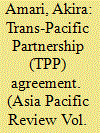

|
|
|
|
|
| Summary/Abstract |
On October 5, 2015, the 12 countries reached an agreement in principle on the Trans-Pacific Partnership (TPP) that will build 21st-century trade and investment rules concerning tariffs, services, investment, intellectual property, state-owned enterprises, and other areas. Going beyond the myriad bilateral FTAs and EPAs, the TPP is intended to give shape to policy relating to trade in the Asia-Pacific. Since Japan officially participated in TPP negotiations in 2013, one focus has been on an economic growth strategy that provides opportunities for small- and medium-sized enterprises to consider overseas expansion and that allows Japan to re-emerge as a major exporting country. Regionally, the TPP is expected to contribute to economic development in the Asia-Pacific as a whole at the dawn of an “Asia-Pacific Century.” As the minister in charge of negotiating for Japan's national interest in the TPP, the author shares his perspective about the agreement.
|
|
|
|
|
|
|
|
|
|
|
|
|
|
|
|
| 8 |
ID:
146406
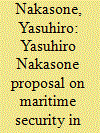

|
|
|
|
|
| Summary/Abstract |
Maritime security in East Asia is essential to the peace and prosperity of the world. Today, serious problems in this domain have arisen in the region. Resolving these problems is a pressing issue that impacts not just the region, but also the preservation of the peace and prosperity of the entire globe. Despite this urgent need, cooperative frameworks for preventing problems from arising in the first place—as opposed to mere security regimes for deterring conflicts—have yet to be organized. To preserve a maritime security order in East Asia that is based on laws and rules, mechanisms based on mutual trust must be arranged for deterring and preventing conflict.
|
|
|
|
|
|
|
|
|
|
|
|
|
|
|
|
|
|
|
|
|